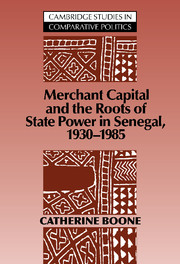Book contents
- Frontmatter
- Contents
- List of tables and figure
- Preface and acknowledgments
- Introduction
- 1 Capital and contingencies of postcolonial politics
- 2 The colonial market
- 3 Consolidation of a regime: Neocolonialism in the 1960s
- 4 Growth of Senegal's textile industry, 1960–1975
- 5 Reappropriation of the state: The 1970s
- 6 Demise of the Dakar textile industry
- Conclusion: States, capital, and capitalist states
- Appendix: Exchange rates
- References
- Index
3 - Consolidation of a regime: Neocolonialism in the 1960s
Published online by Cambridge University Press: 13 October 2009
- Frontmatter
- Contents
- List of tables and figure
- Preface and acknowledgments
- Introduction
- 1 Capital and contingencies of postcolonial politics
- 2 The colonial market
- 3 Consolidation of a regime: Neocolonialism in the 1960s
- 4 Growth of Senegal's textile industry, 1960–1975
- 5 Reappropriation of the state: The 1970s
- 6 Demise of the Dakar textile industry
- Conclusion: States, capital, and capitalist states
- Appendix: Exchange rates
- References
- Index
Summary
The outcome [of colonialism] was a curious paradox: the establishment of a series of capitalist states with deep roots in non-capitalist societies which they were forced to protect as the foundation of their power.
G. B. Kay 1975:106The political leaders of newly independent Senegal inherited control over an economy organized by and for merchant capital. In the 1950s the limits to growth inherent in this economy had become increasingly apparent not only to the managers of France's West African Empire, but also to those who emerged after World War II as contenders for postcolonial state power. High-cost, imbalanced trading structures were asphyxiating and strangling French West Africa, limiting both consumption and production. External trade linkages were not the only problem. The organization of production in Senegal's groundnut basin raised equally grave concerns. In the 1950s Senegalese and French analysts voiced serious doubts about the viability and sustainability of established patterns of export-oriented agricultural production. Extensive groundnut cultivation degraded the land as marabouts and peasants worked to extract the maximum product, as rapidly as possible, with the minimum of investment. The productivity of both land and labor showed signs of regression.
In this context a new regime emerged in the late 1950s and sought to consolidate and entrench its power.
- Type
- Chapter
- Information
- Merchant Capital and the Roots of State Power in Senegal1930–1985, pp. 78 - 130Publisher: Cambridge University PressPrint publication year: 1992



